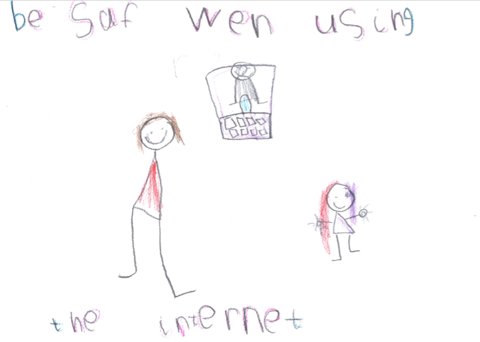Online Safety at Rushey Green Primary School
“The online world is posing an ever-increasing risk to children, and it is important that schools staff, parents and carers work together to take an active role in teaching children about online dangers. Learning how to act safely when using the internet is an incredibly important part of safeguarding our children.”
We believe that:
-
children and young people should never experience abuse of any kind
-
children should be able to use the internet for education and personal development, but safeguards need to be in place to ensure they are kept safe at all times.
We recognise that:
-
the online world provides everyone with many opportunities; however it can also present risks and challenges
-
we have a duty to ensure that all children, young people and adults involved in our organisation are protected from potential harm online
-
we have a responsibility to help keep children and young people safe online, whether or not they are using [name of organisation]’s network and devices
-
all children, regardless of age, disability, gender reassignment, race, religion or belief, sex or sexual orientation, have the right to equal protection from all types of harm or abuse
-
Working in partnership with children, young people, their parents, carers and other agencies is essential in promoting young people’s welfare and in helping young people to be responsible in their approach to online safety.
Rushey Green Primary School has shown our commitment to protecting our pupils online by working with National Online Safety - providing resources for our whole school. Click to find out more. https://nationalonlinesafety.com/enrol/rushey-green-primary-school

Being safe online is not about restricting a child's use of the Internet. There are many organisations which provide help concerning online safety - please click on the links below:
- ChildLine
- Think U know
- CBBC Stay Safe
- Child Exploitation and Online Protection Centre
- Safer Internet. Org
- Digizen. Org
- Kidsmart. Org
- Childnet. Org
- Childnet ages 3 - 7
- Childnet ages 7 - 11

- Net-Aware
- NSPCC Online safety
Online Safety Poster Competition Winners 2020
Online Gaming
The multiplayer action survival game, Fortnite: Battle Royale, has received a lot of media coverage recently due to growing popularity amongst children – and also emerging safety concerns. Here is some information about the game and how to keep your children safe while playing it.
Players can currently play Fortnite: Battle Royale on a PC, Mac, Xbox, and PlayStation or download it from the App Store. Use of the game has grown rapidly amongst children and young people since the launch of the mobile game in March 2018. As of 2nd May, the app version is only available on iOS but an Android release is expected shortly. The game involves 100 players fighting each other in real time to be the final survivor.
What features and risks are there on Fortnite?
Fortnite: Battle Royale has several features that can be fun, but there are also risks. These include:
- Players can add friends in the mobile game if they have an account with Epic, the game’s developer. Friends can be added by username in the game’s main menu.
- There is a chat feature in the game that allows users to contact each other using voice or text. You can disable voice chat in the game by selecting the 3 lines in the top right of the screen, select the settings icon, choose the ‘Audio’ tab at the top of the screen and go to the ‘Voice Chat’ option, where you can select ‘Off’.
- There is cartoon violence in the game. You can use a variety of weapons to kill other players, such as guns and axes.
- There are in-app purchases, which can become expensive.
- Players can be reported to the Player Support team if you are concerned about activity or behaviour.
Age ratings
Here are the recommended age ratings for the game:
- Epic Games: Fortnite Battle Royale says it does not direct the game to children under the age of 13 in the UK.
- The PEGI rating for this game is 12 years old. However, PEGI does not take chat features into consideration when rating games.
- The App Store says that users must be 12+ to play.
Tips to help keep your child safe online when playing online games:
- Talk to your child regularly about what they are doing online and how to stay safe. Let them know they can come to you or another trusted adult if they’re feeling worried or upset by anything they have seen.
- Explore your child’s online activities with your child. Understand why they like using them and make sure they know what they can do to keep themselves safe.
- Agree your own rules as a family when using sites, apps and games.
- Manage your technology and use the settings available to keep your child safe.
Information for Parents

Useful documents for Parents
Parent Workshop and Responsible Internet UseA useful resource if your child is exposed to media surrounding the Netflix show 'Squid Game'.
|
.png)
.jpg)
.jpg)
